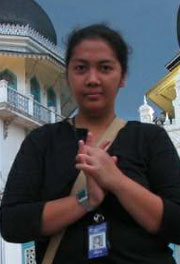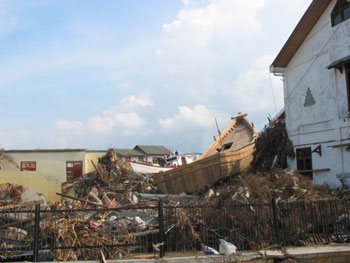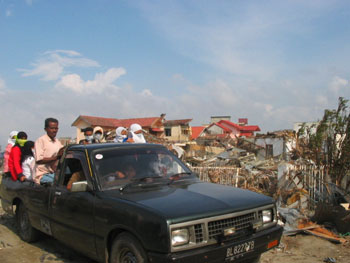 |
 | |||||||
No Lie
February 2005
|
 |
||||||
|
"What are you doing here?" A little boy stood near the mass grave of thousands victims washed by tsunami. He was alone. "I want to say good bye to mother." There, somewhere in the mountain of human bodies was a heart that this little boy had come home to when he feared the world outside. Naked and afraid, he would have to say farewell. There in Desa Bada just outside of Banda Aceh, the boy, already lost in tears, watched the big excavator drag bodies to a big hole that was now the grave of his mother and another 16 thousand people more. I did not dare ask his name. The whole city smelled like death. "Death seemed more real for us still living here!" said an Aceh man next to me. It should be real I thought. I had known death here before this; Aceh is the land of perpetual conflict and distrust, where bullets are the angel of death. But no one ever thought that it would not be bullets that killed more than a hundred thousand people in just seconds. It was water; black water that carried away of concrete, woods, people's homes, and crumbles of history.
"I had her in my hands, but then the wave took her away. I saw her vanished in the blackness of water. Please, don't ask me about my family anymore." A father survived. A daughter died. The story goes. I remembered on the first day when the news broke. Not even 12 hours after the quake, BBC news reported 9 thousands people counted dead. I shouted there at the news room, "Bull! That can't be right!" But it was no lie. "I lost 41 in my family." "I lost 10 people." "I am alone now." Day by day I carried on listening to the living in search of their lost loves; while my eyes and nose carried on with visions and smells of rot.
It was really hard during the first week, when the only way to communicate was by satellite phone. It was almost telepathy just to manage a live report from Banda Aceh that time. We were busy getting the connection done while a refugee sat there in the hot chair for a conference with the studio. "What the frequency again?" Jakarta headquarters shout. "4014 Mhz, symbol rate 6000." Oh God, should I repeat this again and again. Then, we go live. It was always like that; you have the tears, we have the screen. Let's get this thing over with and let me go outside again. Another show's done, and another story to go. There goes another feed from Aceh, the land with so many tales of grief. I survived the guilt by wishing that somehow, someway our reports could open people's eyes so they can open their hearts. Just a little help, just a little hand would do. Three weeks later, I came home to Jakarta headquarter. Everything seemed normal, except the billboards now carried the sign said Peduli Aceh, it means care for Aceh. I just hope they won't get bored and forget. Just as always, it was headlines and the first segments of a newscast... then it slides and somehow gone. I remembered a sign in a building near Lambaro just north of Banda Aceh saying, Jangan Tinggalkan Aceh! It means don't leave Aceh. I just pray... a survivor pray that the helping hands would stay. Because I can leave, yet the people of Aceh had to stay.
© Delvi Sinambela
Dispatches are brought to you by Canon. Send Canon a message of thanks. |
|||||||
Back to February 2005 Dispatches
|
|


